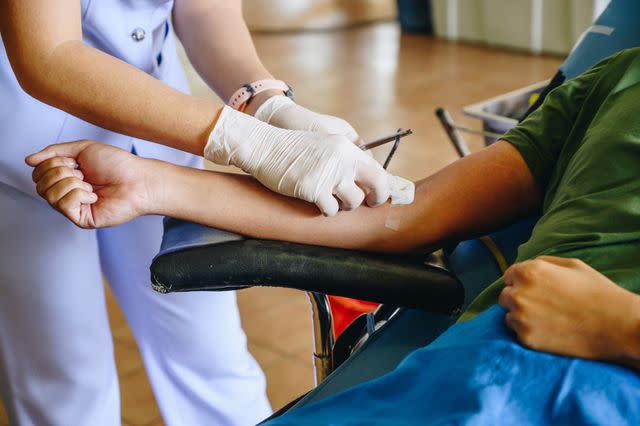How an IgE Blood Test Checks for Allergies
What to Expect from an Immunoglobulin E (IgE) Test and Understanding the Results
Medically reviewed by Daniel More, MD
To diagnose an allergy, you may need to have a blood test that measures immunoglobin (IgE), an antibody that helps the body fight off foreign bodies, such as bacteria and viruses. An IgE blood test can determine levels of different IgE antibodies. If levels are too high, it indicates an allergy.
Allergies occur when the immune system reacts to a foreign substance from something eaten, touched, or inhaled into the lungs. In extreme cases, anaphylactic allergies can be deadly.
This article explains who should have an IgE test, what to expect, IgE levels, and treatment for high IgE results.

Boy_Anupong / Getty Images
Who Should Be Tested?
An allergen-specific IgE test may be done to look for several kinds of allergies, such as:
Certain foods
Pollen
Latex
Mold
Some types of medicine
Animal dander
Pollen
Dust mites
Insect venom from bites or stings
An IgE test can also help monitor a person with a known allergic condition, such as:
Allergic conjunctivitis: Eye allergies
Allergic rhinitis: Hay fever
Chronic rhinosinusitis: Inflammation of the nasal passages and sinus cavities
Your healthcare provider may also recommend an IgE blood test if you're experiencing allergy symptoms, such as:
Sneezing
Coughing
Wheezing
Stuffy or runny nose
Itchy, watery eyes
Hives (itchy, raised red patches on the skin)
Diarrhea or vomiting
Shortness of breath
Allergy blood tests are also available for those who cannot tolerate allergy skin testing. This requires placing an allergen directly on the skin. A blood test may be preferred if an individual is at high risk of developing a severe reaction to an allergy skin test or for young children who may be too uncomfortable having a skin test.
What to Expect
Types of IgE blood tests include:
A total IgE test: A measurement of the total amount of IgE antibodies in your blood
A specific IgE test: A measurement of how much IgE your body makes in response to a particular allergen
The blood test usually takes less than a few minutes and requires a quick needlestick prick. First, a healthcare provider will insert a small needle into one of the veins in your arm. After insertion, a small amount of blood will be collected into a test tube or vial.
There is no preparation for an IgE blood test. After the blood collection, your healthcare provider will apply pressure to the area for a few minutes and apply a Band-Aid. You may have a small bruise for a few days at the site.
Results
Everyone has some IgE in their blood. If IgE test results suggest you have an allergy, your healthcare provider may refer you to an allergist or immunologist who can help with a treatment plan.
High IgE
A total IgE test result that is high means that you could have some kind of allergy. A high specific IgE test result means that you may be allergic to the allergen tested.
But both results don't show what you're allergic to or how severe your allergy may be. Your healthcare provider may recommend more testing.
Normal IgE
Everyone has some IgE in their blood. Different allergy blood test brands can vary in how they test for IgE. Normal values for adults typically fall between 1.53 to 114.0 international units per milliliter (IU/mL). A normal result typically means that the test did not indicate an allergy.
Low IgE
Low serum IgE is associated with:
Chronic fatigue
A higher likelihood of autoimmune and oncological diseases
Chronic sinusitis, or inflamed sinuses
Otitis media, or fluid in the ear
Other Factors That Affect IgE
Other conditions that can cause high IgE include:
Allergic rhinitis, asthma, and allergic dermatitis
Parasitic diseases
Cystic fibrosis with the presence of atopy (a genetic predisposition to develop allergic diseases such as allergic rhinitis, asthma, and eczema)
Kawasaki's Disease
False Positive Test Results
About 50% to 60% of all blood tests and skin prick tests will yield a “false positive” result. This means the results may say you have an allergy when you don't. This may happen if your body is having a slight reaction to substances in certain foods that you may have eaten before the test.
Your healthcare provider may recommend that you get retested to confirm a diagnosis.
Treatment
Your treatment plan will depend on what you are allergic to and how serious your symptoms are.
Your allergy specialist may recommend additional testing to help determine each allergen that may be causing your allergies, such as:
A skin prick test (SPT)
An intradermal test (IDT)
These tests require placing a small number of substances that may be causing allergies on or just beneath the skin's dermis, most often on the back or arm.
One of the most effective treatment plans for allergies involves avoiding the allergen altogether. Home remedies for mild allergies may include:
Using an air filter or dehumidifier
Vitamin D
Prescription and over-the-counter (OTC) medications may help with allergy systems, such as:
Antihistamines: Block histamines to reduce allergy symptoms
Decongestants: Help relieve congestion
An asthma inhaler: A hand-held device containing a medication called a bronchodilator that delivers medicine to your lungs
Talk to your healthcare provider first if you want to try medications for allergies.
Summary
An allergen-specific IgE blood test can measure the levels of different IgE antibodies. If they are too high or too low, it may suggest that the person is allergic to something or it may indicate a more serious health condition.
Your healthcare provide may do additional testing to determine the allergen and appropriate treatment for your situation.
Read the original article on Verywell Health.

